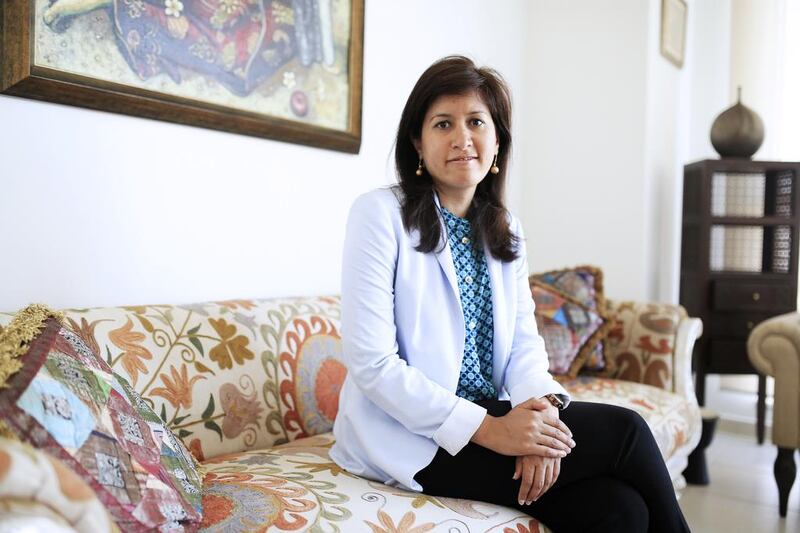Sadaffe Abid is one of Pakistan's most successful businesswomen. She was the chief executive of the Kashf Foundation, one of the largest microfinance institutions in Pakistan, growing it from a pilot project in two rooms, to serve 300,000 female clients with micro-loans. Ms Abid also co-founded the Buksh Foundation, a Pakistani start-up that enhances financial access to micro entrepreneurs. After 13 years in micro-financing, Ms Abid now splits her time between Dubai and Pakistan, conducting leadership training focused on developing high-potential female professionals and entrepreneurs and emerging talent.
What was your inspiration for wanting to help Pakistani women?
I’m from an educated family of men and women, and my father worked in the military so we had a tight budget. But I was able to get a scholarship to study at Mount Holyoke College in the US. That opened my mind to possibilities – I met people from different cultures, developed a love for learning and growth and wanted to go back to Pakistan to make a difference. I started out in development, doing two years of consulting work for the World Bank and the Asian Development Bank. I went to slums and rural communities in Pakistan, which gave me a great appreciation of how the majority of Pakistan live. Their daily challenges were very different from mine. Over 5.1 million primary school-aged children are out of school in Pakistan – the third highest number of out-of-school children in the world – and 63 per cent of them are girls. However it’s a society that’s changing, and female role models are emerging.
What does the Kashf Foundation do for women?
I joined Kashf in 1997 when it was a two-room incubator in Lahore. At the beginning we didn’t know much about micro-financing, we were really working like a lab. I worked with the founders to turn Kashf into an organisation that employs 2000 staff and has disbursed US$200 million. Kashf micro-finances small businesses for women who are earning $2 to $3 a day. We help them open grocery stores, make bangles or shoes and buy goats by giving women micro-loans starting at US$100, and going up to $1,000.
Why did you turn your focus to helping other female business leaders?
I got another scholarship for a masters in entrepreneurship and leadership at Harvard Kennedy School in the US. I learnt the adaptive leadership model with professor Ron Heifetz, which really inspired me.
Two years ago I moved to Dubai and started running leadership programmes with women in the UAE and Pakistan. The idea was to enable them to become more effective at exercising leadership and to create a group of women who can engage, sponsor and mentor each other.
Who are the women on your leadership programmes?
We’ve had 30 Emirati, Arab, South Asian and western high-potential women go through the programme here. These women were looking at accelerating their growth and also becoming effective and purposeful in their personal life. I also work with emerging female professionals, young women just starting their careers that are really interested in learning. Women in companies like PwC, Microsoft, Dell, MasterCard, Sharjah Business Women’s Council, Dubai Holding and DP World have participated in our programmes.
How does the programme work?
It’s about empowering women so they can tap into their unique strengths. We create a safe space for discussions on what’s working, what’s not, and where women can step up. For example, to exercise leadership you’ve got to have a stomach for conflict and difficult conversations. But women generally tend to be stabilisers. So they develop self-awareness about their defaults and blind spots. What’s different about us is that our leadership techniques are innovative – it’s not a lecture-based model, it’s very experiential. So we get women to practice new behaviours in the room. For example if you want to be a risk-taker, what would risk- taking look like during the programme? Because we’re all born with these qualities. It’s just that based on our culture, environment and family, some qualities get nurtured more than others. We practice using the muscles we’re not used to using.
How can workplaces evolve to better support women leaders?
Workspaces were built when men were in the majority, so they still reflect that. Having more women in positions of decision-making power will make a difference, as will having more candid conversations about balancing the needs of raising a family and work life, and engaging with men on these topics to understand their perspectives. There are many unconscious biases that we carry as women and men and these discussions help us peel the layers. There’s a lot of potential for society to be more holistic, to recognise the different roles women have. It would also be valuable to have men in senior positions mentor and sponsor women, it would lead to such a great exchange.
business@thenational.ae
Follow us on Twitter @Ind_Insights





